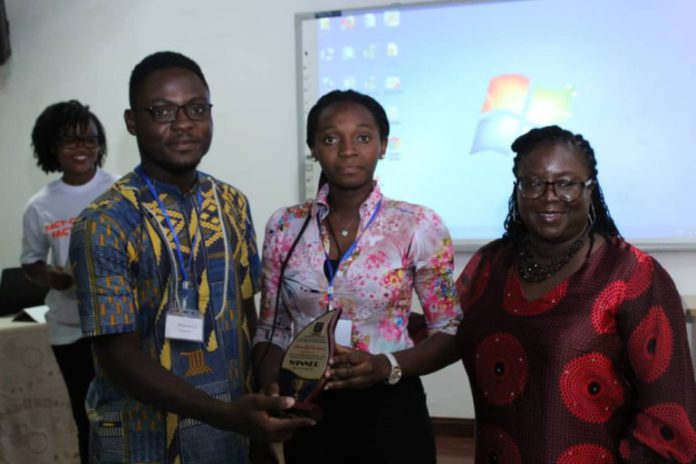National Film and Television Institute (NAFTI) students studying Broadcast journalism have emerged as winners of the maiden edition of the Inter-Tertiary Media and Information Literacy Quiz competition held at the University of Ghana, Legon.
The competition, dubbed “Spot the Fake”, tested contestants’ knowledge on how to spot fake news.
Other institutions that participated in the competition were graduate students from the University of Ghana and their undergraduate counterparts from Ghana Institute of Journalism (GIJ), African University College of Communications (AUCC) and the University of Professional Studies, Accra (UPSA).
The quiz, which ended last Wednesday, October 23, 2019, was organised by the School of Information and Communication Studies (SICS) of the University of Ghana in conjunction with Dubawa, independent verification and fact-checking platform.
Dean of the SICS, Professor Audrey Gadzekpo, commenting on the contest said the school was using the platform to “create awareness about fake news, to sensitise young people, especially students to be very careful about what they consume and take steps to verify them.”
“During elections, especially, we should be wary of things that we receive on social media where we can’t attribute the source or have no idea who the source is. We must take extra measures to determine whether indeed it’s true or fake”.
NAFTI contestants, Constance Evans and Noah Batsa Ayertey, garnered 32 points to beat their closest contestants, the Department of Information Studies of the University of Ghana, who had 23 points. AUCC, GIJ, the SICS, UPSA and Wisconsin International University College had 18, 12, 9, 9, 9 points respectively.
“With coaching and motivation from our lecturer, Mr Selorm Adogla, we burnt the midnight oil and we put in our best [to win],” said Constance Evans, a NAFTI contestant.
Head of the Broadcast Journalism Department at NAFTI, Mary Ayim-Segbefia said: “our model which combines theory with serious practical work helps students, not only to master their practical skills, but also retain a lot of what is taught”.
“After all, it’s been proven that participation, which in our case is the practical work, has a very high correlation with the number of lessons that are retained.”
The undergraduate degree journalism programme at NAFTI started in 2016 with the current final year students being the first batch.
The department has fully-equipped television and radio studios where students put into practice what they are taught.
NAFTI is one of the most prestigious media schools in Africa with state-of-the-art facilities for teaching and learning. It places much emphasis on the practical application of knowledge in its pedagogical approach.

